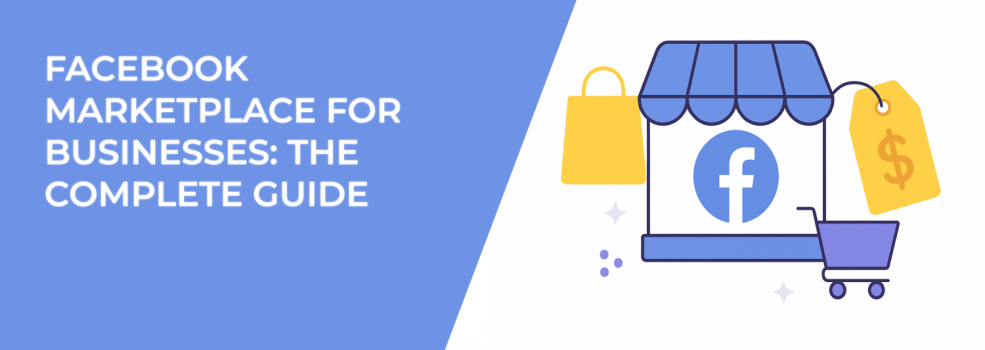Facebook Marketplace isn’t just for people selling old couches anymore. It has turned into a powerful sales channel for businesses — from small shops to big e-commerce brands. With millions of people browsing Marketplace every month, it’s a place where potential customers are already looking to buy.
And here’s the best part: Marketplace combines free listings with paid ads. That means you can reach shoppers organically, then boost your reach with targeted campaigns.
What Is Facebook Marketplace for Businesses?
Marketplace is Facebook’s built-in shopping space. Think of it like an online mall inside the Facebook app, where people scroll through categories like clothing, furniture, electronics, and even cars.
For businesses, Marketplace works as a storefront that lives right where your customers already spend time. Instead of pulling people to a separate website, you show up directly in the flow of their daily browsing.
Why Marketplace Matters for Businesses in 2025
So, why should businesses care about Marketplace?
-
Huge audience — Over one billion people use Marketplace each month.
-
High intent — Unlike scrolling through the News Feed, Marketplace users are actively shopping.
-
Local + global reach — Sell to people nearby or use shipping to reach farther.
-
Ad integration — Pair organic listings with paid ads to scale your results.
If you’re already running campaigns, Marketplace fits neatly into your Facebook Ads funnel, helping people move from discovery to purchase faster.
How to Get Your Business Started
The setup is simple. You don’t need a separate account — just a Facebook Page.
-
Make sure your Page info is complete and professional.
-
Head to Marketplace and create a listing with photos, price, and description.
-
Choose whether to offer shipping or local pickup.
-
If available in your region, enable checkout so people can buy directly.
-
Connect your product catalog to Commerce Manager if you plan to run ads.
Good images and clear details are key. Think of your listing like a storefront display: if it looks sloppy, shoppers will pass you by. Want to know why presentation matters so much? Check out The Psychology of Facebook Ads.
Tips to Succeed on Marketplace
A few practical tips can make your listings stand out:
-
Use strong photos. Natural light, clean backgrounds, and multiple angles go a long way.
-
Write descriptions that sell. Don’t just list features — highlight benefits and uses.
-
Price smart. Marketplace is full of comparison shoppers. A fair price can make you the first choice.
-
Reply fast. Quick responses improve your ranking and build trust with buyers.
-
Keep listings fresh. Repost or update items regularly so they stay visible.
For local shops, pairing these tips with a local Facebook marketing strategy makes Marketplace even more powerful.
Advertising on Facebook Marketplace
Here’s where things get interesting. Listing an item is free, but running ads in Marketplace gives you a much bigger reach.
Here’s how ads in Marketplace work:
-
You create ads through Meta Ads Manager — just like any other campaign.
-
You set your budget and choose your placements. If you use Meta Advantage+ placements, Marketplace is included automatically (along with Feed, Instagram, Messenger, and more).
-
Ads only appear in Marketplace on mobile devices through the Facebook app.
-
Your ad will be labeled “Sponsored” and show up alongside other listings.
-
When people click, they can go to your website, app, or view the product inside Marketplace.
Important: you can’t run ads only in Marketplace. They’ll always appear in both Feed and Marketplace. And, like any campaign, they must follow Meta’s Advertising Standards.
The big advantage is placement. Your ad shows up when someone is already shopping. That’s why Marketplace ads often deliver better intent-driven clicks than standard awareness campaigns. If you’re curious about placements and scaling, check out The Ultimate Guide to Facebook Ads in 2025.
Examples of How Businesses Can Use Marketplace
Marketplace isn’t just for retailers. Here are some ways different businesses can benefit:
-
Retail brand — A clothing boutique lists seasonal items and runs ads to highlight bestsellers.
-
Service provider — A cleaning company promotes a “first-visit discount” and gets leads from nearby homeowners.
-
Car dealership — Listings for vehicles show up to shoppers already searching for cars.
-
Real estate agent — Rental properties and open house ads reach people looking for homes.
-
E-commerce shop — An online store lists trending products to drive traffic back to its website.
No matter the industry, the idea is the same: show up where buyers are already searching.
Challenges You Should Expect
Like any platform, Marketplace comes with a few challenges:
-
Time — Answering questions and managing listings takes effort.
-
Competition — More businesses are showing up every year. Quality matters.
-
Features — Checkout and shipping aren’t available everywhere yet.
The good news? If you take Marketplace seriously, you’ll stay ahead while others still treat it as a side project. New to paid campaigns? Start with the Beginner’s Guide to Facebook Ads.
What’s Next for Marketplace
Meta keeps rolling out updates for Marketplace — better catalog integrations, safer buying, and more advanced ad tools. The platform is growing fast, and businesses that adopt early will have a clear advantage before the space gets too crowded.
So the real question is: will you grab that advantage now, or wait until your competitors already own the space?
Final Thoughts
Facebook Marketplace gives businesses something rare — a mix of free exposure and paid ads in a space where people are ready to shop. Whether you’re running a local service, selling cars, or growing an e-commerce store, Marketplace deserves a place in your strategy.
Start small with listings, test ads, and see how buyers respond. You might be surprised how quickly it drives results.

